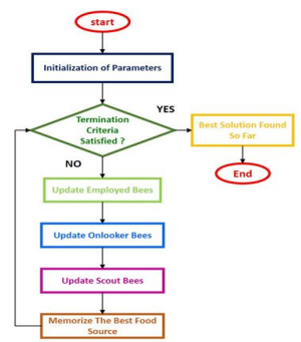Implementation of Evolutionary Algorithms for Improving Energy Consumption in Wireless Sensor Networks
Project Code :TMMACO79
Objective
The main objective of the project is to calculate the energy consumption using ABC, ACO and PSO optimization techniques.
Abstract
´Wireless Sensor Networks (WSNs) consists of a huge
number of tiny, low-priced, and battery-powered devices with limited on board
sensing, processing and communication capabilities. The batteries of sensor
nodes of WSNs are usually with limited capacity; hence it is essential to
conserve battery energy to prolonging the WSNs lifetime. Therefore, this paper
deals with the matter of energy consumption minimization to maximize the
overall network lifespan. In this research, a mathematical model for the lifetime
of WSN is formulated based on several parameters to find out the optimal
solution of the energy problem in the field of wireless sensor networks using
the Particle Swarm Optimization (PSO),Ant Colony Optimization (ACO) and Artificial bee
colony(ABC) algorithms. In this regards, ABC algorithm acts with
much better efficiency as computational time minimizes, simple, has stable
convergence characteristics than ACO and PSO algorithms.
´Index Terms: Wireless Sensor Network, Routing
Algorithm, Ant Colony Optimization, Particle Swarm Optimization (PSO)
NOTE: Without the concern of our team, please don't submit to the college. This Abstract varies based on student requirements.
Block Diagram

Specifications
Software & Hardware Requirements:
Software: Matlab 2018a or above
Hardware:
Operating Systems:
- Windows 10
- Windows 7 Service Pack 1
- Windows Server 2019
- Windows Server 2016
Processors:
Minimum: Any Intel or AMD x86-64 processor
Recommended: Any Intel or AMD x86-64 processor with four logical cores and AVX2 instruction set support
Disk:
Minimum: 2.9 GB of HDD space for MATLAB only, 5-8 GB for a typical installation
Recommended: An SSD is recommended a full installation of all Math Works products may take up to 29 GB of disk space
RAM:
Minimum: 4 GB
Recommended: 8 GB
Learning Outcomes
LEARNING OUTCOMES
- Introduction to Matlab
- What is EISPACK & LINPACK
- How to start with MATLAB
- About Matlab language
- Matlab coding skills
- About tools & libraries
- Application Program Interface in Matlab
- About Matlab desktop
- How to use Matlab editor to create M-Files
- Features of Matlab
- Basics on Matlab
- Basics of wireless sensor networks
- About Leach protocols.
- How system modal can be formed in Matlab.
- Construction of algorithm according to system modal
- Analyzing and visualization of plots.
- About WSN lifetimes.
- About cluster heads and aggregators.
- About data transmission in-between nodes.
- Phases of data transmission:
- Generation of input data
- Construction of WSN nodes
- How to extend our work to another real time applications
- Project development Skills
- Problem analyzing skills
- Problem solving skills
- Creativity and imaginary skills
- Programming skills
- Deployment
- Testing skills
- Debugging skills
- Project presentation skills
- Thesis writing skills
Related Topics





 Paper Publishing
Paper Publishing
